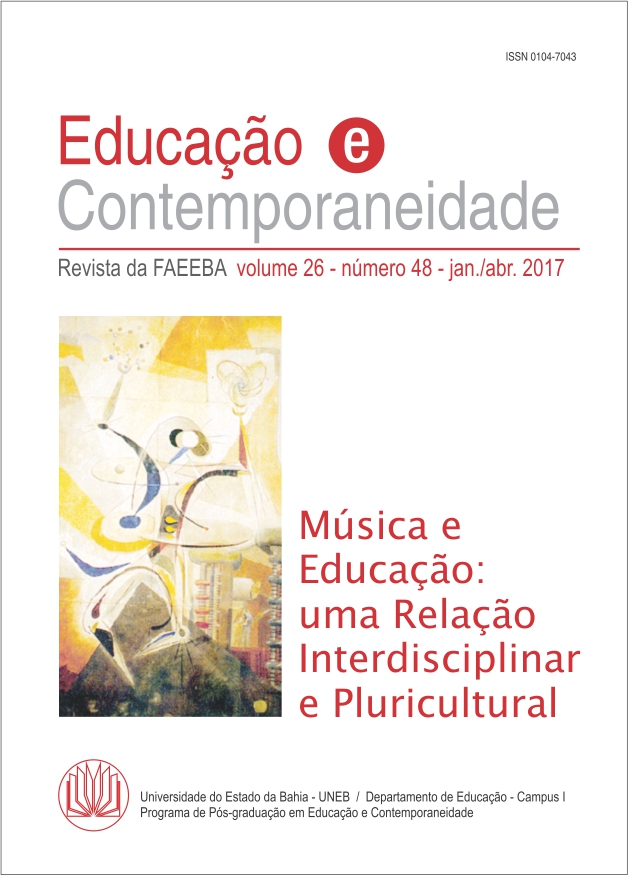REINSTATING THE SOFT SCIENCE OF AFRICAN INDIGENOUS MUSICAL ARTS FOR HUMANITYSENSED CONTEMPORARY EDUCATION AND PRACTICE
DOI:
https://doi.org/10.21879/faeeba2358-0194.2017.v26.n48.p61-78Keywords:
Musical-arts, Soft-science, Indigenous, Advancement, HumanningAbstract
The paper argues that the philosophical, theoretical and performative principles as well as proactive humanity intentions, which frame indigenous African heritage in the musical arts (synergy of music, dance, drama and material properties) furnish exemplary knowledge resources, which should inform humanity conscious education policy, curriculum orientation and content as well as knowledge transmission dynamics in modern African classrooms, and beyond. Sample philosophical, humanning and epistemological ideals that mark indigenous African musical arts formulations as a soft science of sublime humanity and societal management, are outlined. They remain contemporaneously valid and viable for cognitive as well as respectful advancement into Africa-sensed classroom education practice that is conscientious about developing sound-humanity as well as equitable society through affirmative classroom education. The researched and discerned uniquely African creative formulations, experiential theory as well as purposive transmission modalities furnish the resource paradigms that have been applied and tested as contemporaneously efficacious in the three different proactive education sites cited in the paper. The cumulative research and practical experimentations have enabled the design as well as knowledge content of model curricula for culture-sensed musical arts education in modern African Primary and Secondary education.
Downloads
References
AGAWU, Kofi. Representing African music – postcolonial notes, queries, positions. New York: Routledge, 2003.
BLACKING, John. A common sense view of all music. Cambridge: Cambridge University Press, 1987.
MANS, Minette. To pamwe or play: the role of play in arts education in Africa. International Journal of Music Education, n. 39, p. 50-64, 2002.
NZEWI, Meki. African Music: theoretical content and creative continuum. Oldershuasen: Institut fur Didaktik popularer Musik, 1997.
______. African musical arts creativity and performance: the science of the sound. Nigerian Music Review, n. 6, p. 1-7, 2005.
______. African musicianship in the global thrust: redemption for disorienting human pulse. In: LEONG, Samuel (Ed.). Musicianship in the 21st century: Issues, trends & possibilities. Sydney: Australian Music Centre, 2003. p. 219-333.
______. Dance in Musical arts education. In: NZEWI, Meki; NZEWI, Odyke. A contemporary study of musical arts informed by African indigenous knowledge systems: Illuminations, reflections & explorations. V. 4. Pretoria: CIIMDA, 2007a. p. 207-218.
______. African musical arts: managing uniqueness within techno-deculturing. In: NZEWI, Meki; NZEWI, Odyke: A contemporary study of musical arts informed by African indigenous knowledge systems. Illuminations, reflections & explorations. V. 4. Pretoria: CIIMDA, 2007b. p. 221-277.
______. Africa-sensed research methodology for re-kindling the performance of social-psychical health among (South) African children. In: MASOGA, Mogomme; NZEWI, Meki; NZEWI, Odyke. African indigenous knowledge-sensed musical arts education – policy considerations. Sommerset West: African Minds, 2009. p. 108-123.
NZEWI, Meki; ANYAHURU, Israel; OHIARAUMUNNA, Tom. Musical sense & musical meaning – an African perception. Amsterdam: Rozenberg, 2009.
NZEWI, Odyke. Engendering the humanity imperatives of African creativity in contemporary global scientific, technological, artistic and political practices. In: MASOGA, Mogomme; NZEWI, Meki; NZEWI, Odyke. African indigenous knowledge-sensed musical arts education - policy considerations. Sommerset West: African Minds, 2009. p. 57-67.
RUDDOCK, Eve. “Sort of in your blood”: inherent musicality survives cultural judgment. Research in Music Education, v. 34, n. 2, p. 207-221, 2012.
Downloads
Published
How to Cite
Issue
Section
License
O encaminhamento dos textos para a revista implica a autorização para a publicação.
A aceitação para a publicação implica na cessão de direitos de primeira publicação para a revista.
Os direitos autorais permanecem com os autores.
Após a primeira publicação, os autores têm autorização para a divulgação do trabalho por outros meios (ex.: repositório institucional ou capítulo de livro), desde que citada a fonte completa.
Os autores dos textos assumem que são autores de todo o conteúdo fornecido na submissão e que possuem autorização para uso de conteúdo protegido por direitos autorais reproduzido em sua submissão.
Atualizado em 15/07/2017



